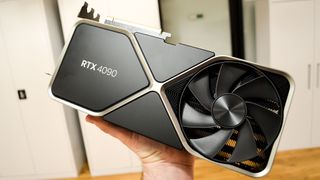Nvidia RTX 5090 GPU price hike could be much less painful than a previous rumor suggested
Confusion around RTX 5090 graphics card pricing from the rumor mill

Nvidia’s RTX 5090 may not be as eye-wateringly expensive as a recent rumor suggested, according to another leaker who has chimed in on the matter.
Moore’s Law is Dead floated the idea of an RTX 5090 that could cost from $2,000 up to $2,500, but on X, Kopite7kimi – another regular leaker in the world of GPUs – has claimed that this is ‘totally fake’ no less.
Totally fake.October 10, 2024
Kopite7kimi adds to the thread: “I don’t believe there will be a significant price increase for RTX 5090.”
Predictably enough, the subsequent replies on X are full of attempts at guessing what the price point of the RTX 5090 might be. Not to mention trying to get the leaker to offer something firmer than there not being a significant hike for the next-gen flagship GPU, but Kopite7kimi wouldn’t be drawn to add anything else.

Analysis: Make some noise (once again), PC gamers
Clearly, Kopite7kimi feels quite strongly about the RTX 5090 pricing prediction from Moore’s Law is Dead, as shown by the language of their reply (‘totally fake’ is a pretty blunt statement, let’s face it).
Of course, Kopite7kimi is still predicting a price hike for the RTX 5090 GPU, but just that Nvidia won’t make this a ‘significant’ increase, which we guess would indicate something in the region of a rise of $100 to $200 ($300 at a push, perhaps).
We’d like to be reassured by this latest nugget from the grapevine, but we remain nervous about the potential pricing of the RTX 5090 – and the rest of the next-gen Blackwell range of graphics cards for that matter. Notably, Kopite7kimi doesn’t talk about the price of the RTX 5080 here (or RTX 5070), which are the GPUs where the cost is really going to matter to consumers when it comes to buying one of the best value GPUs.
Get the best Black Friday deals direct to your inbox, plus news, reviews, and more.
Sign up to be the first to know about unmissable Black Friday deals on top tech, plus get all your favorite TechRadar content.
Nvidia’s flagship graphics cards remain a relatively niche proposition, and to some extent there is an attitude that people will pay through the nose for these GPUs, almost whatever the cost (within some kind of vague reason). And that’s partly why expectations of the RTX 5090 costing so much are relatively easily accepted (not meaning that people like this notion, not at all – it’s just that they can readily believe it, ourselves included).
If you look at the prices that the current RTX 4090 has hit now (Lovelace flagship models are continuing to rise in price), and you take into account Nvidia’s big AI ambitions – with heavyweight Blackwell GPUs for AI usage that make a fortune, turning huge profits compared to GeForce graphics cards, so AI is where the priority for chip allocation will inevitably lie – it’s easy enough to be pessimistic about how much the RTX 5090 will cost.
We guess the good news here, though, is the expression of such a different viewpoint on the potential price hike for the RTX 5090 reminds us that the rumor mill is a volatile place by its very nature.
We should further remember that Moore’s Law is Dead did also heavy caveat his pricing prediction in terms of it being Nvidia exploring and mulling where to pitch its next-gen GPUs – no actual decision has been made yet. Indeed, the YouTuber further raised the possibility that letting slip these prices could even be an intentional move from Nvidia to gauge reaction from PC owners out there (as if you couldn't predict what that would be).
Still, the point remains that all the rumor peddlers out there are saying Nvidia has not made any decision on pricing yet. And in that respect, it may not be a bad idea to pre-emptively rail and make noise about potentially hefty price hikes for Blackwell GPUs – to ensure Team Green hears the displeasure of would-be buyers of the RTX 5090, and indeed 5080 and 5070. All of these next-gen GPUs might be aired at CES 2025 (possibly alongside new Blackwell laptop graphics cards, too).
You might also like
Darren is a freelancer writing news and features for TechRadar (and occasionally T3) across a broad range of computing topics including CPUs, GPUs, various other hardware, VPNs, antivirus and more. He has written about tech for the best part of three decades, and writes books in his spare time (his debut novel - 'I Know What You Did Last Supper' - was published by Hachette UK in 2013).
